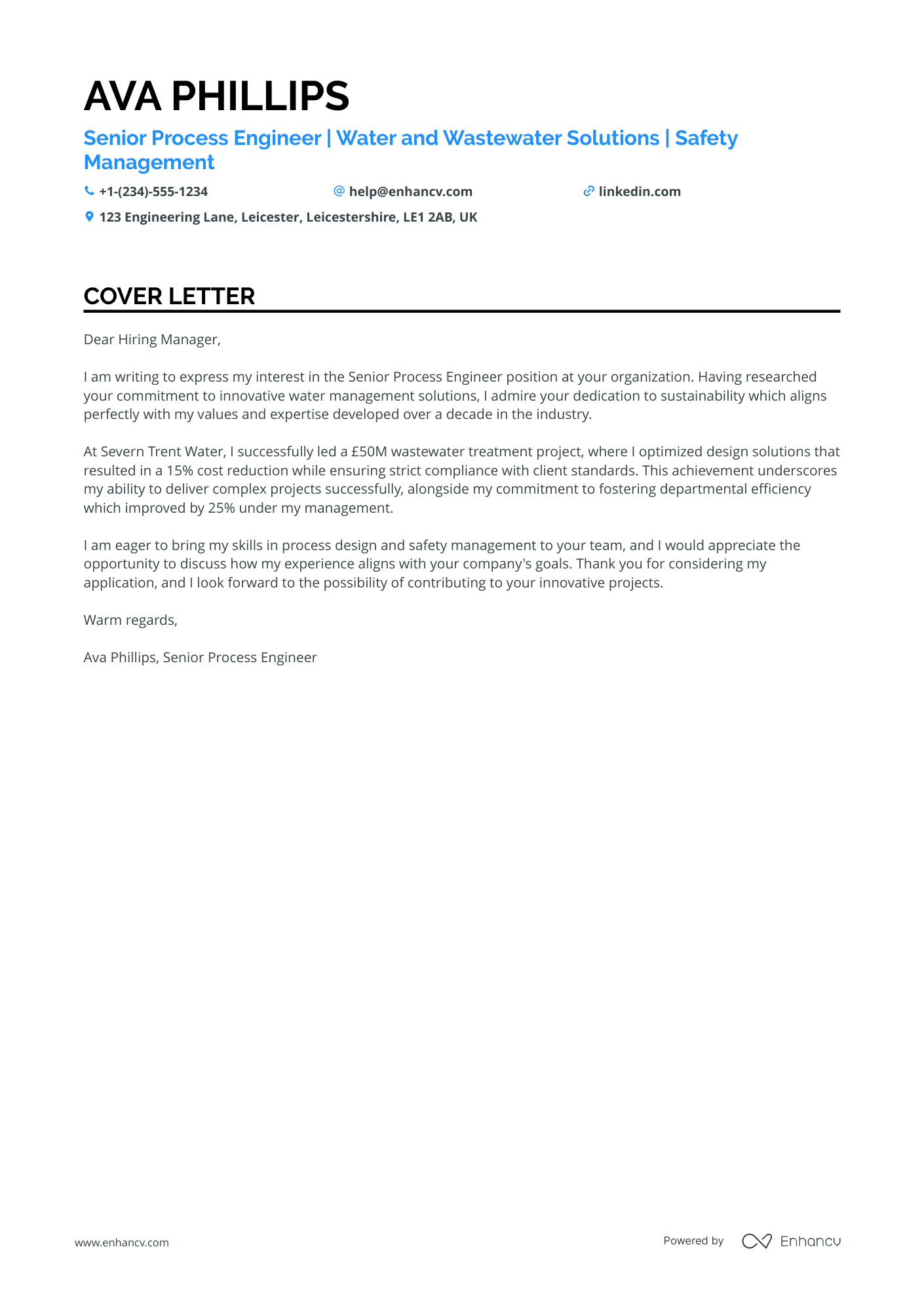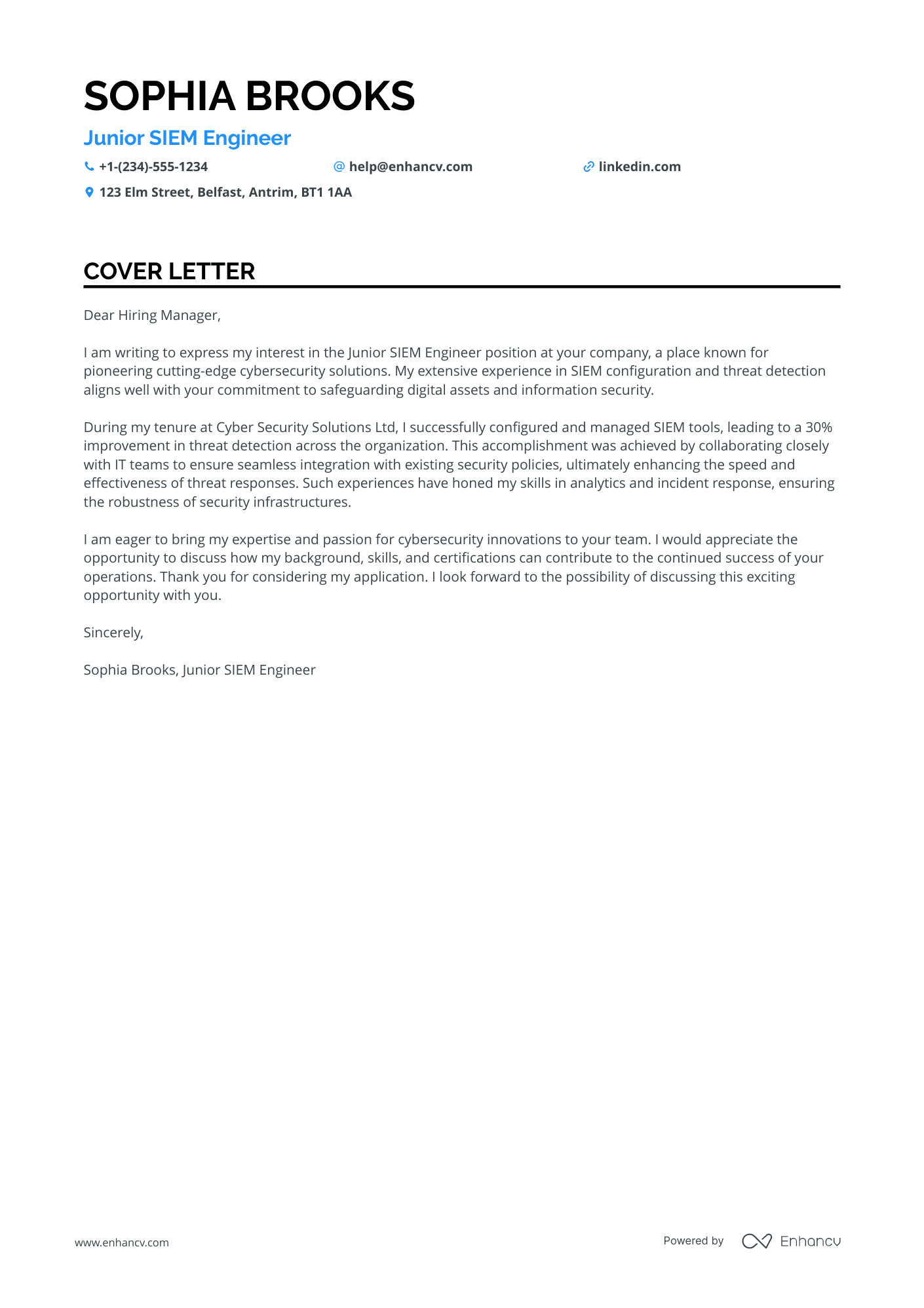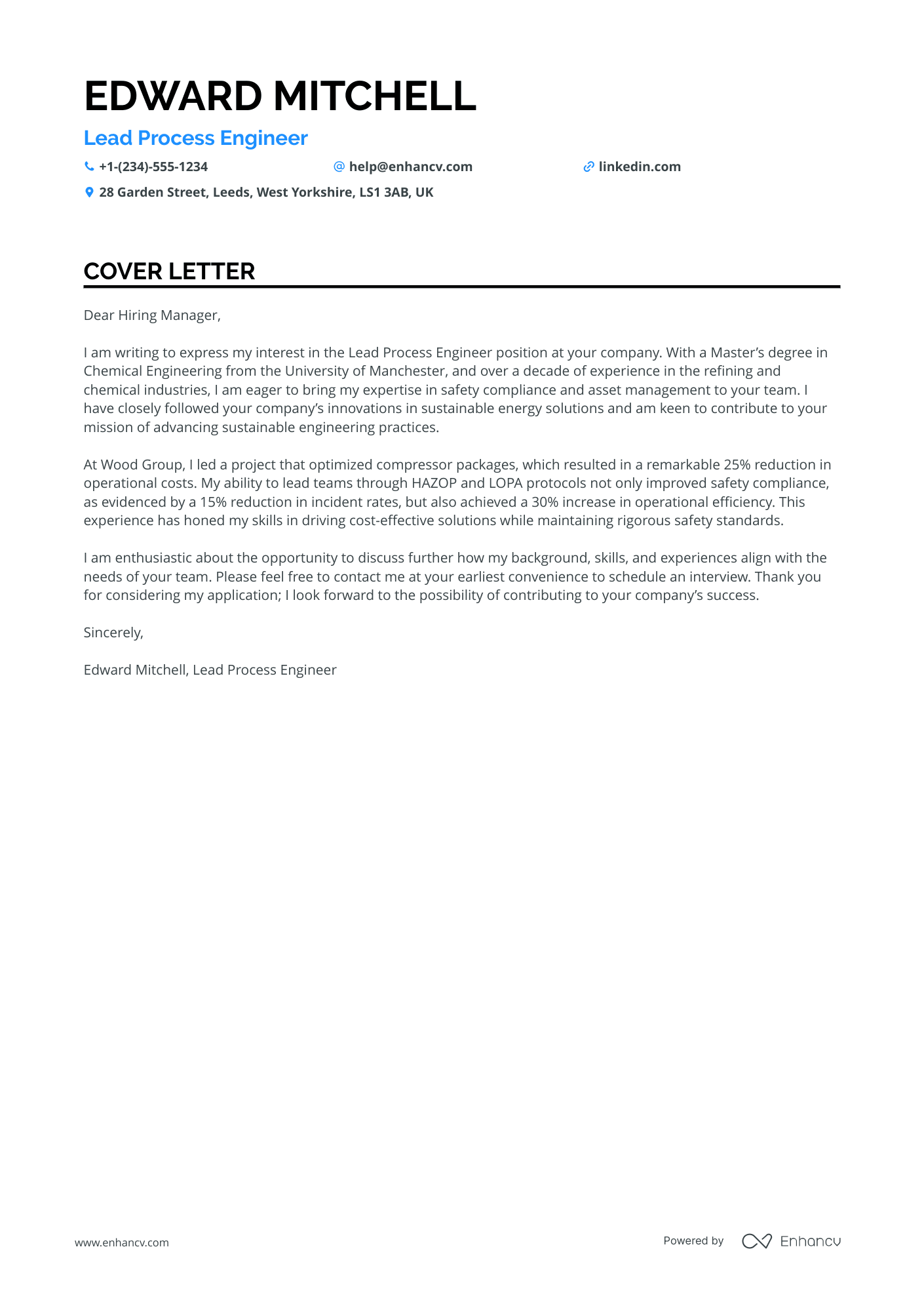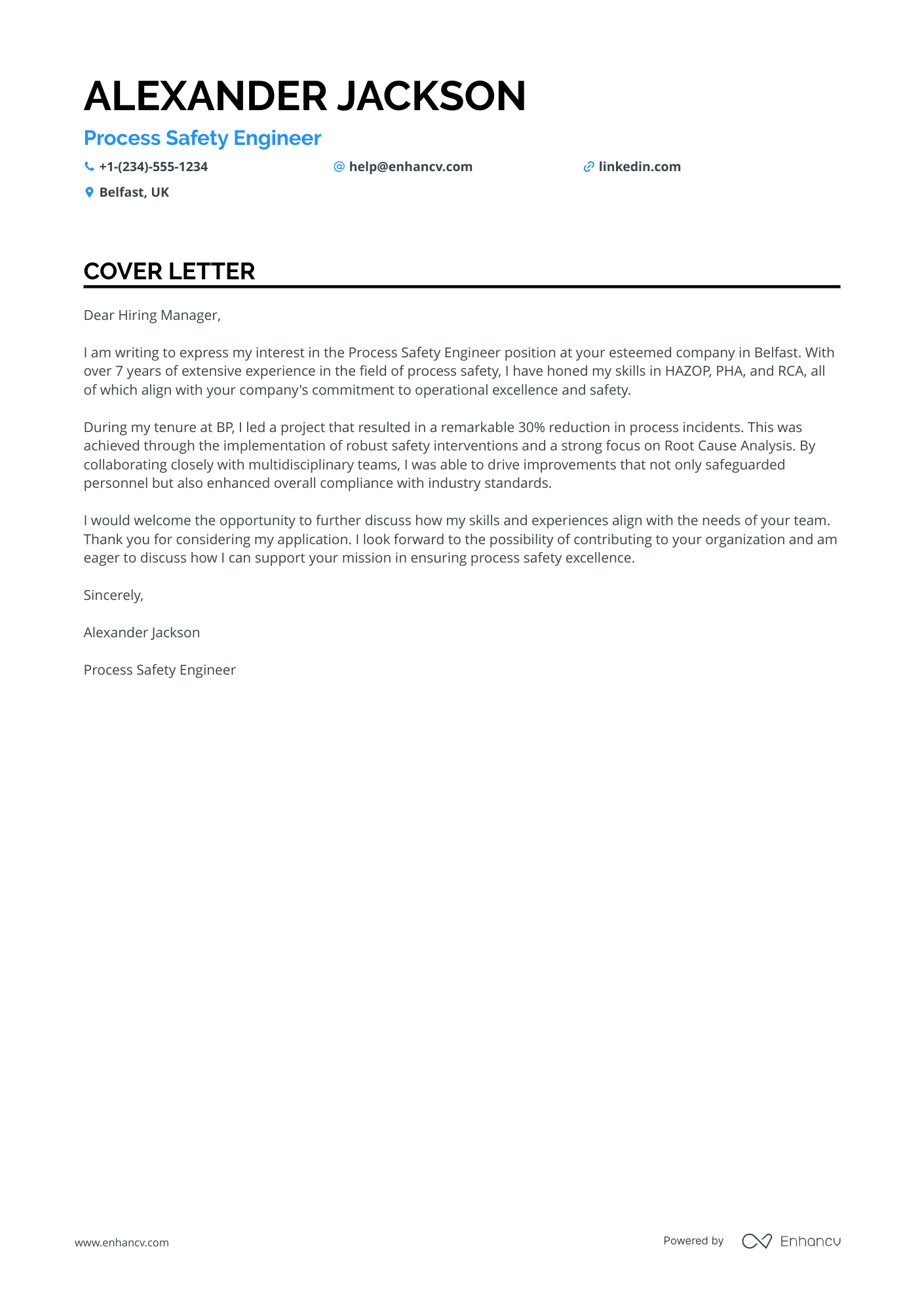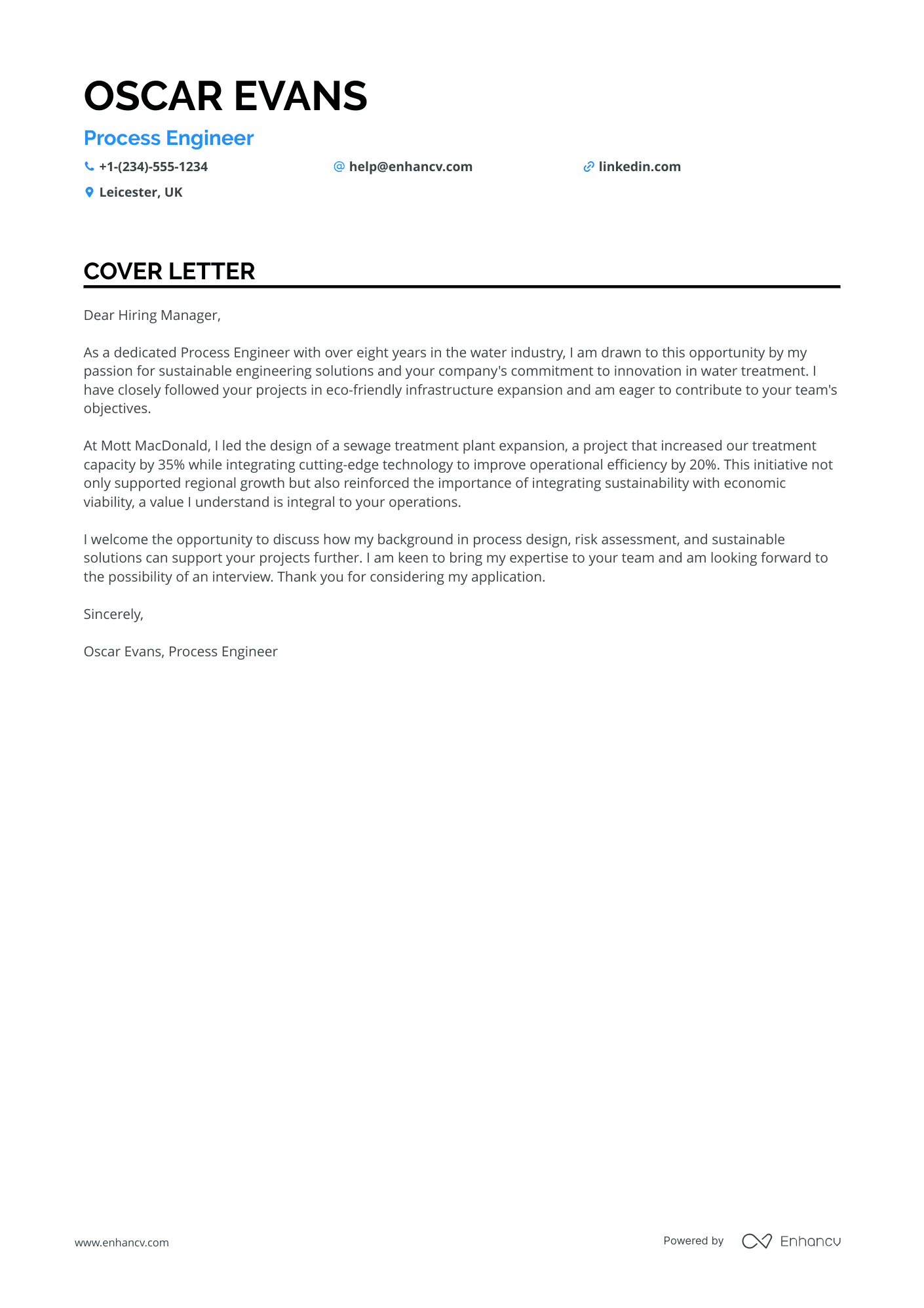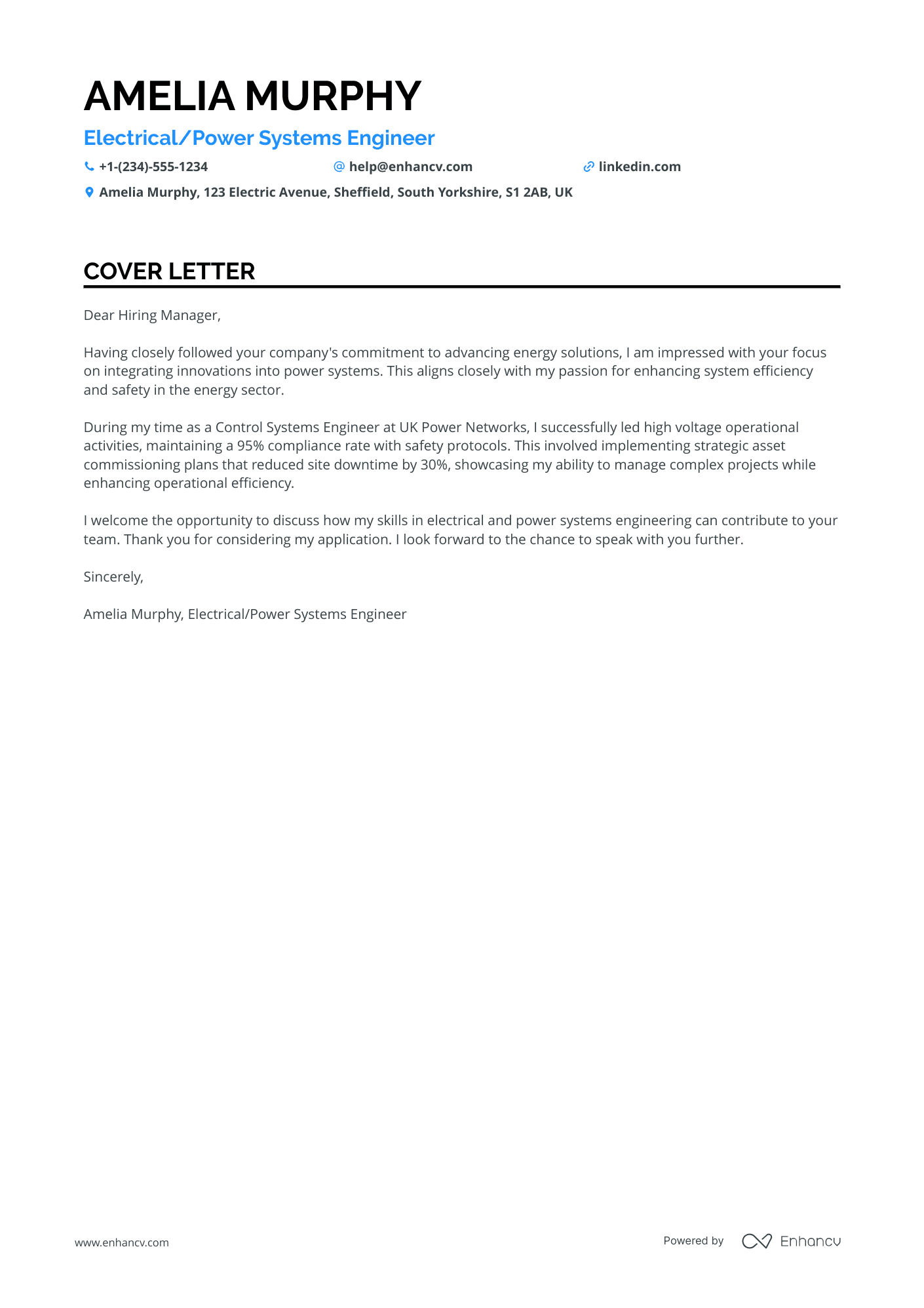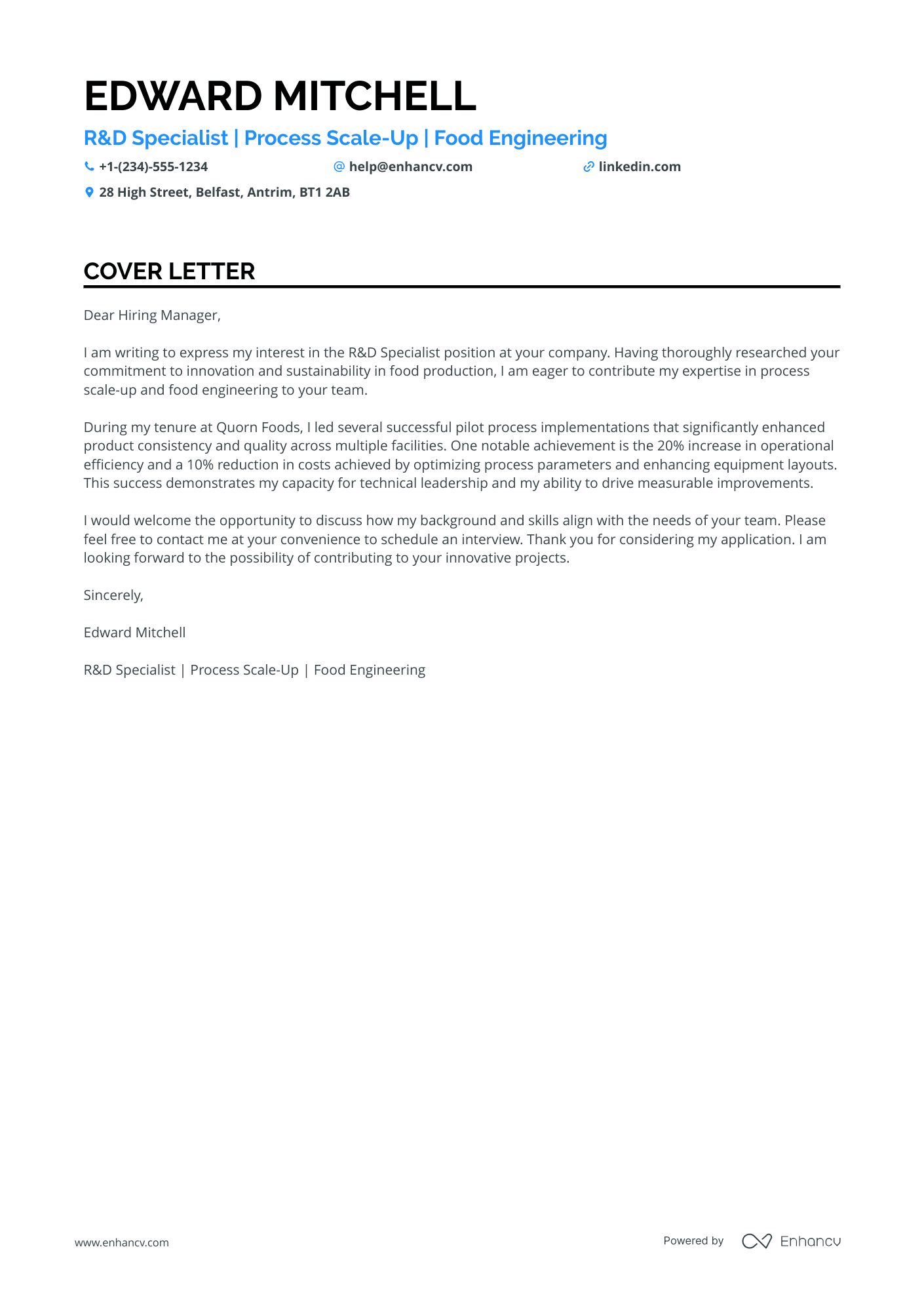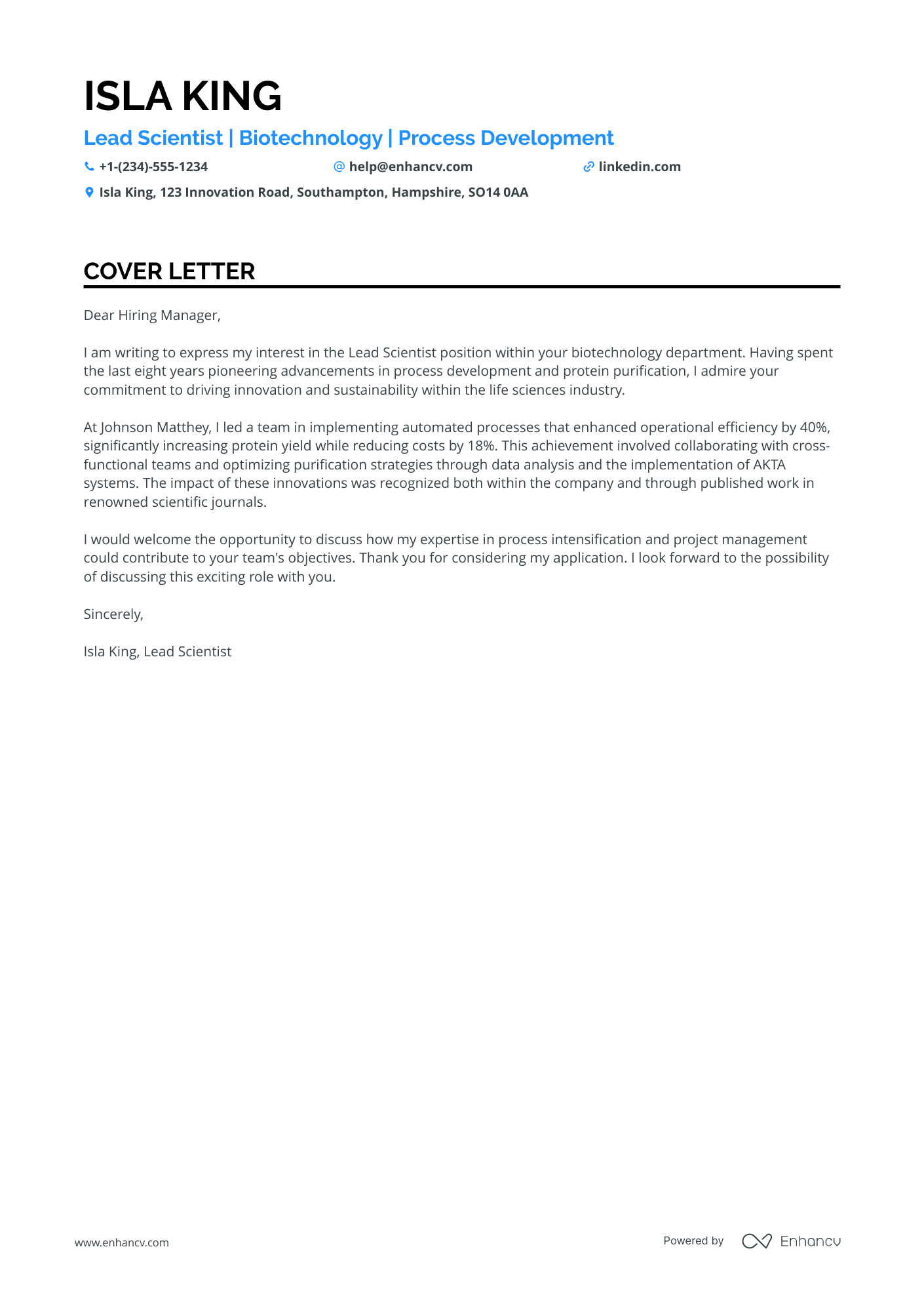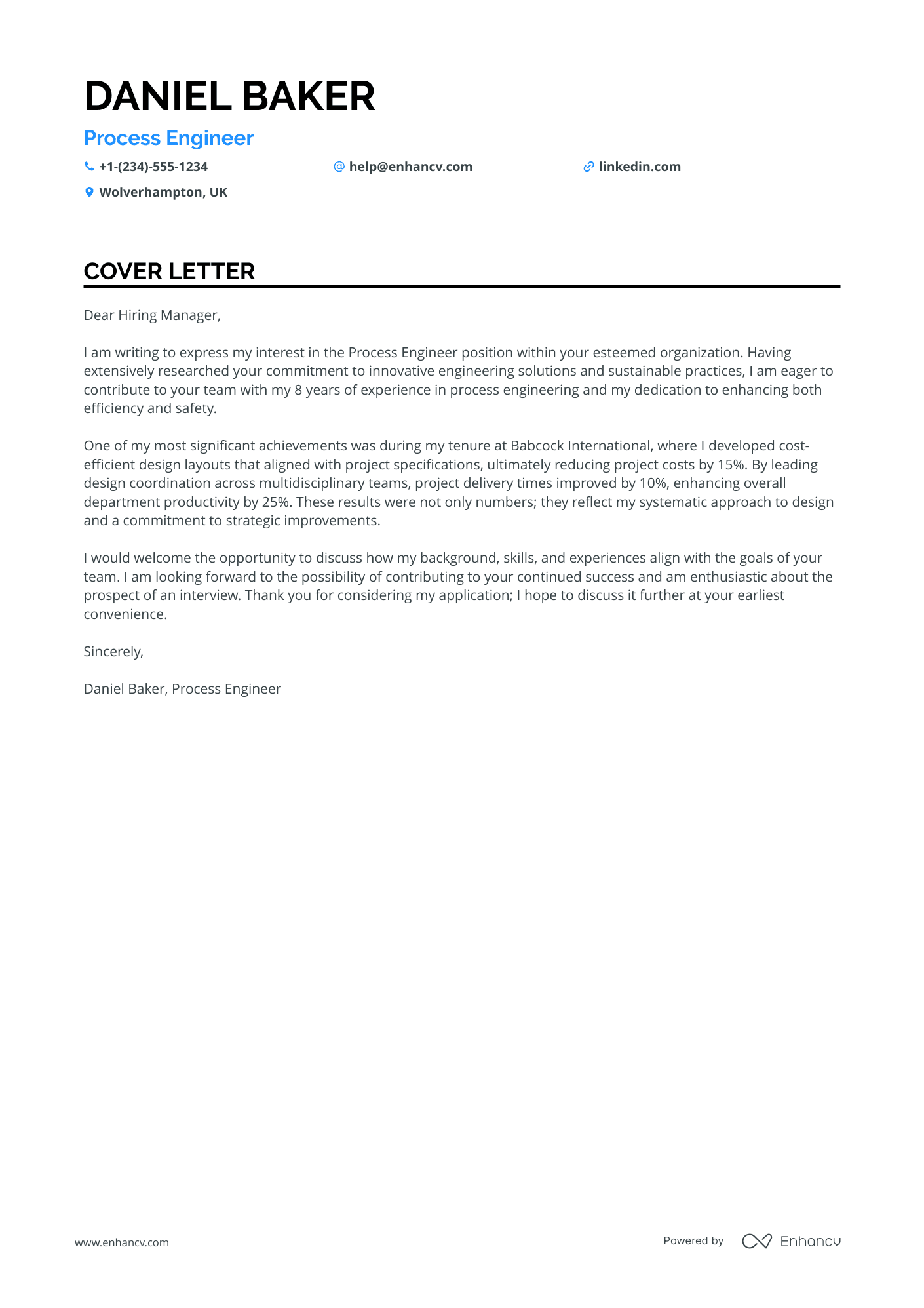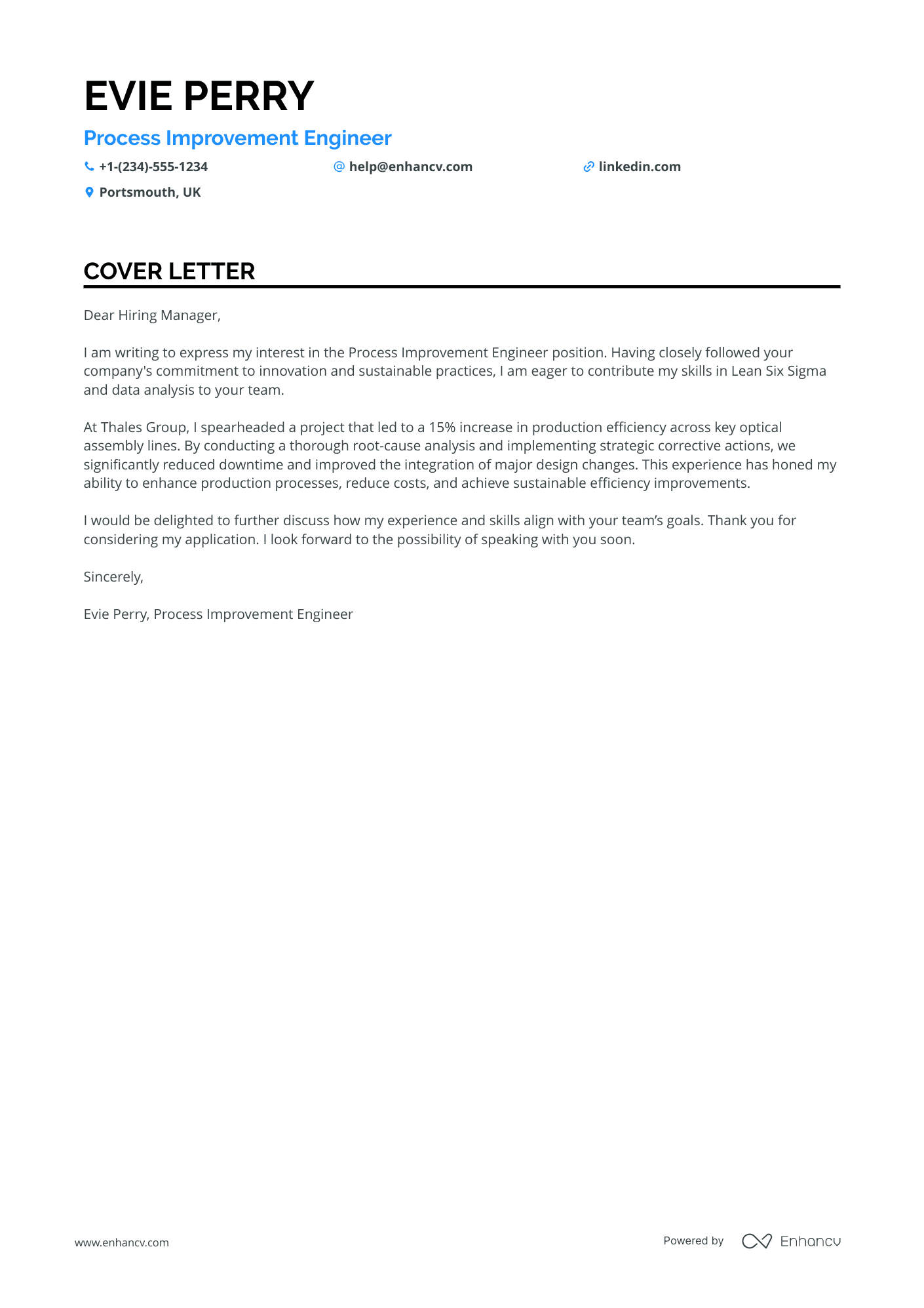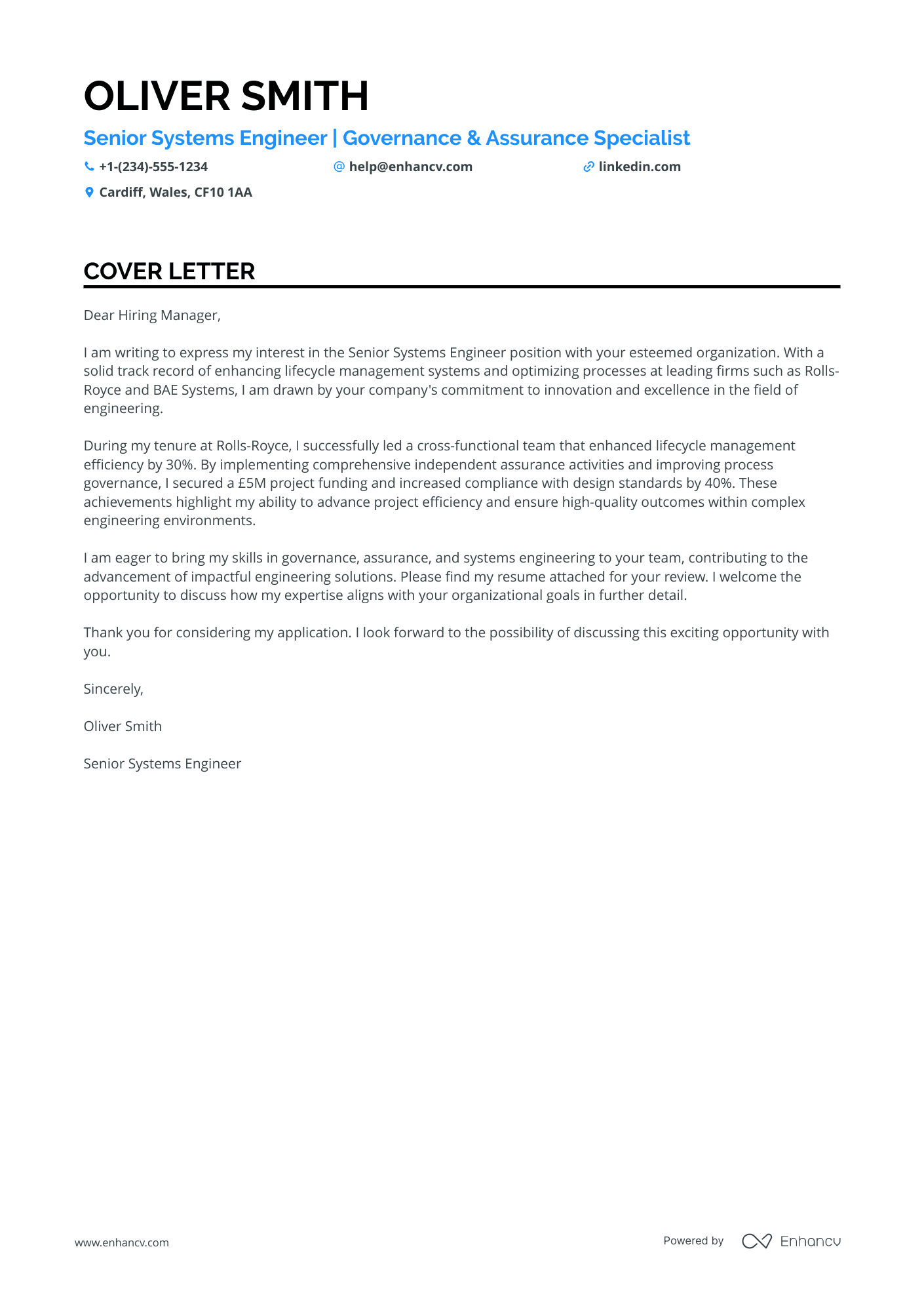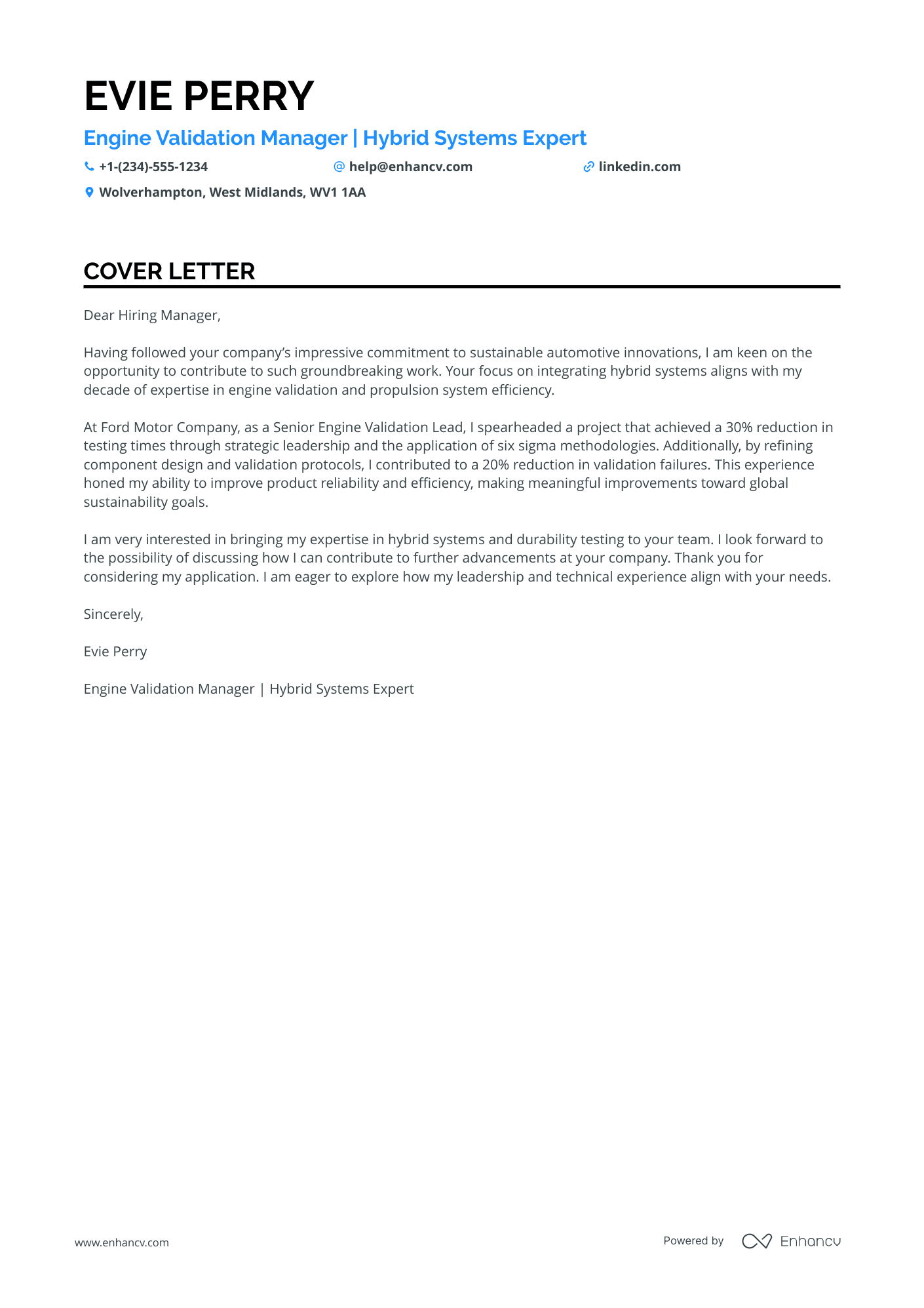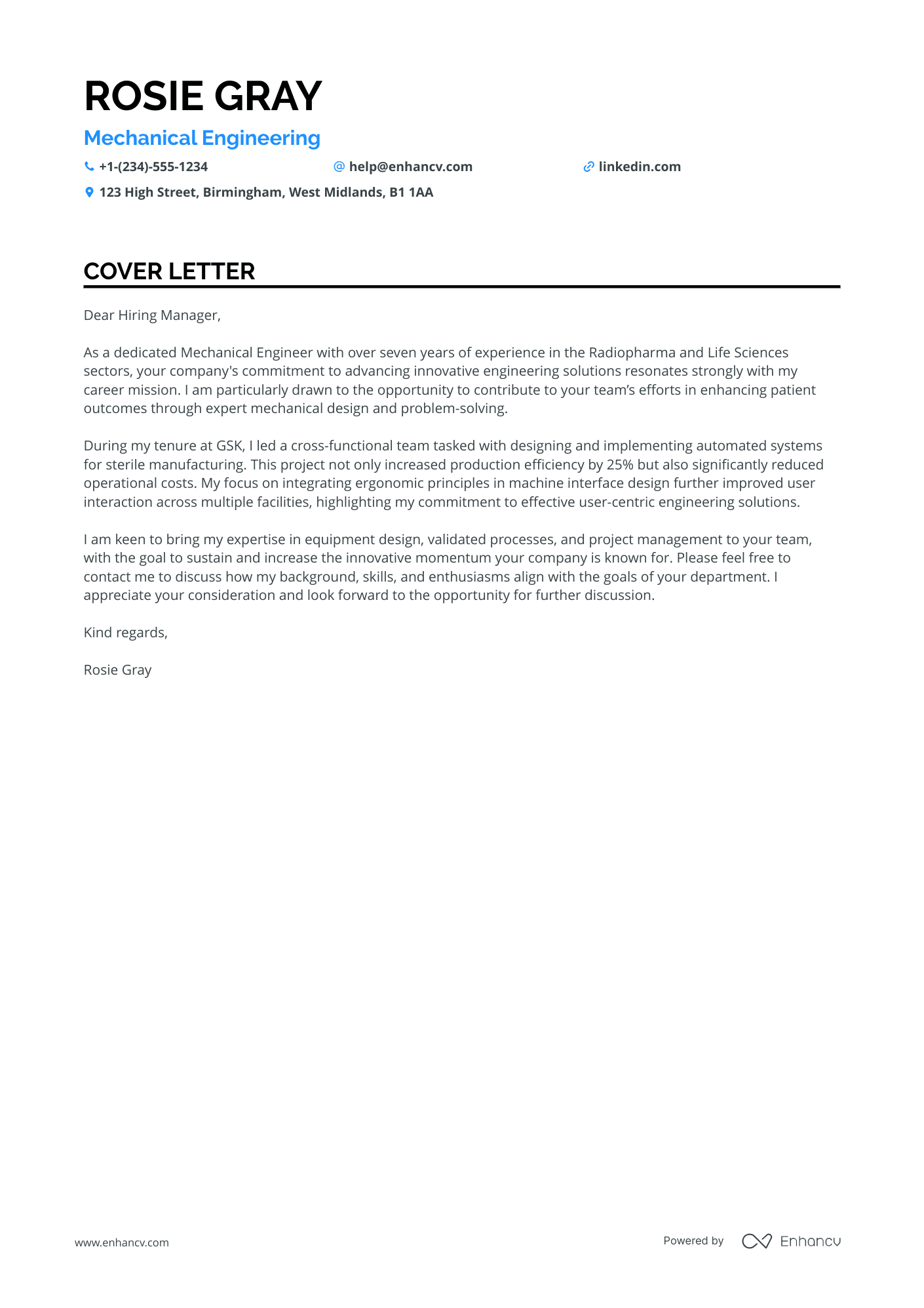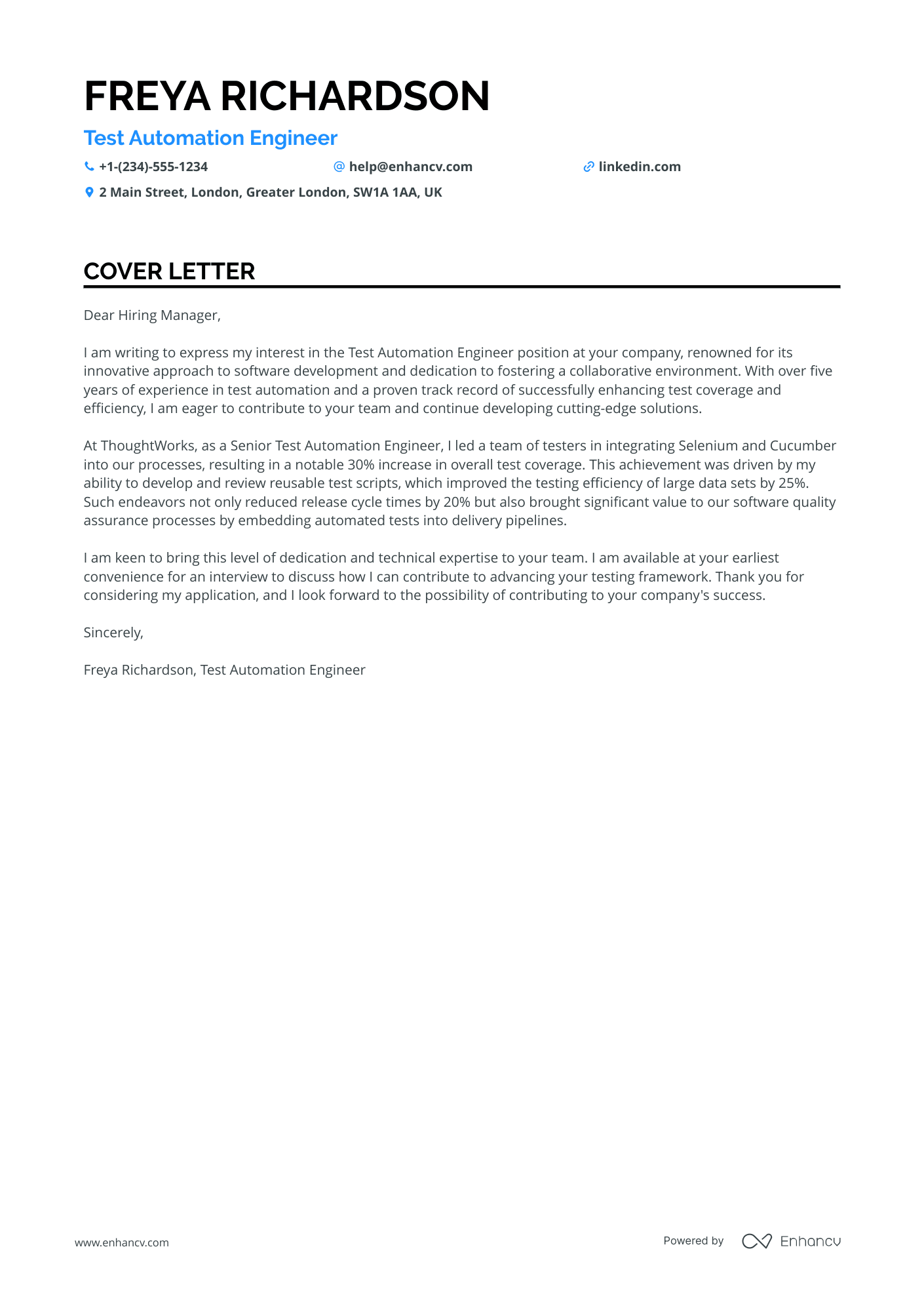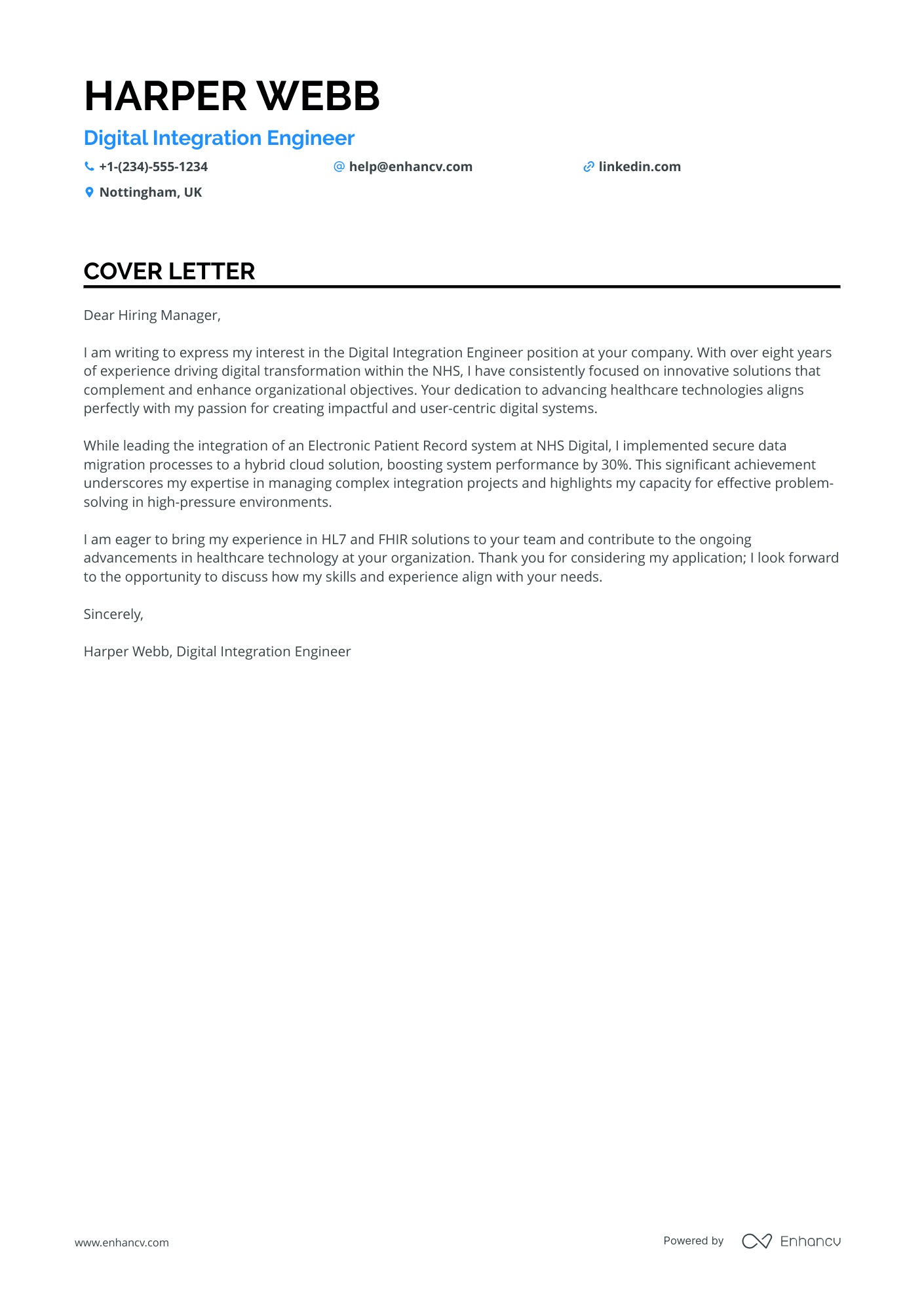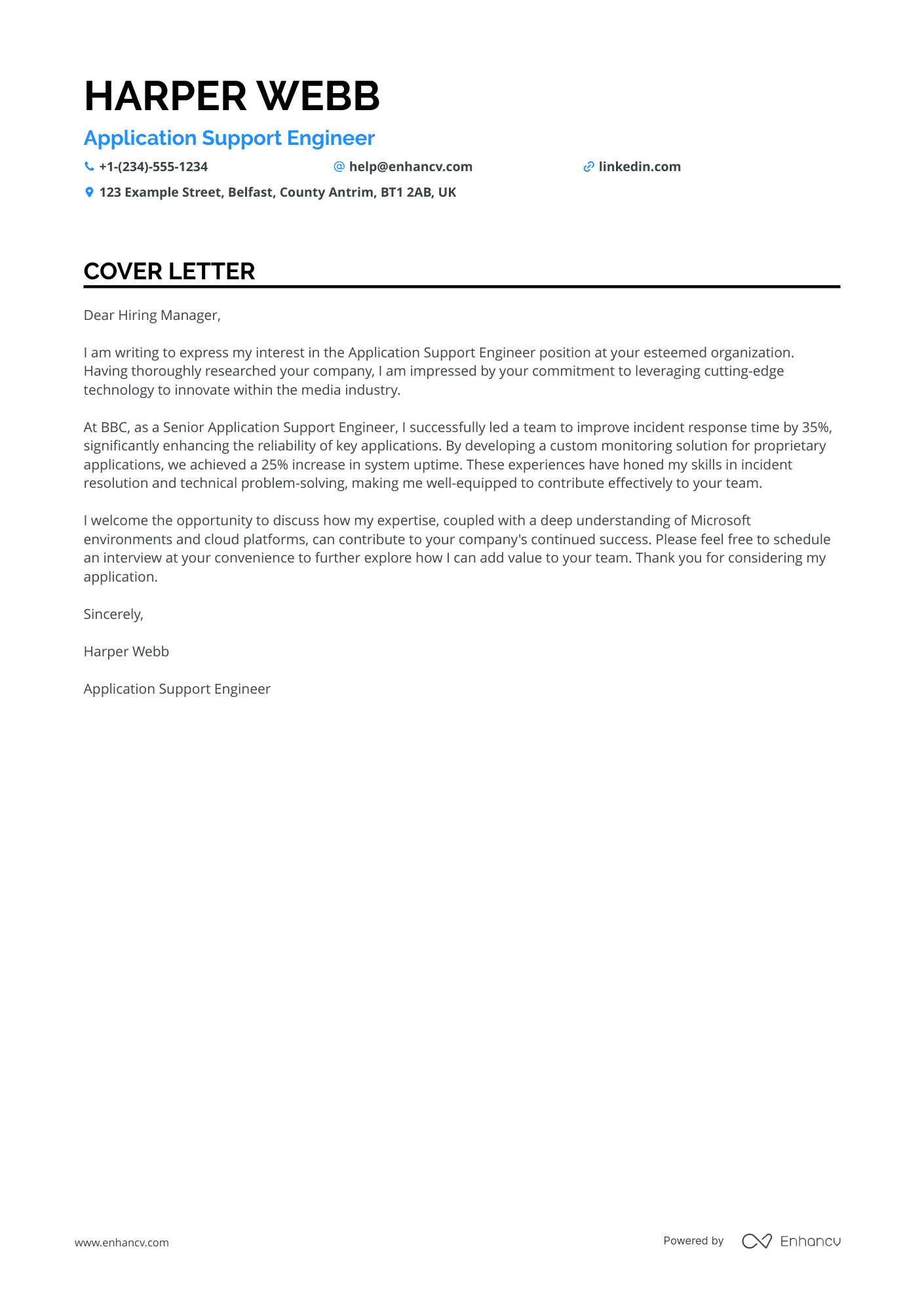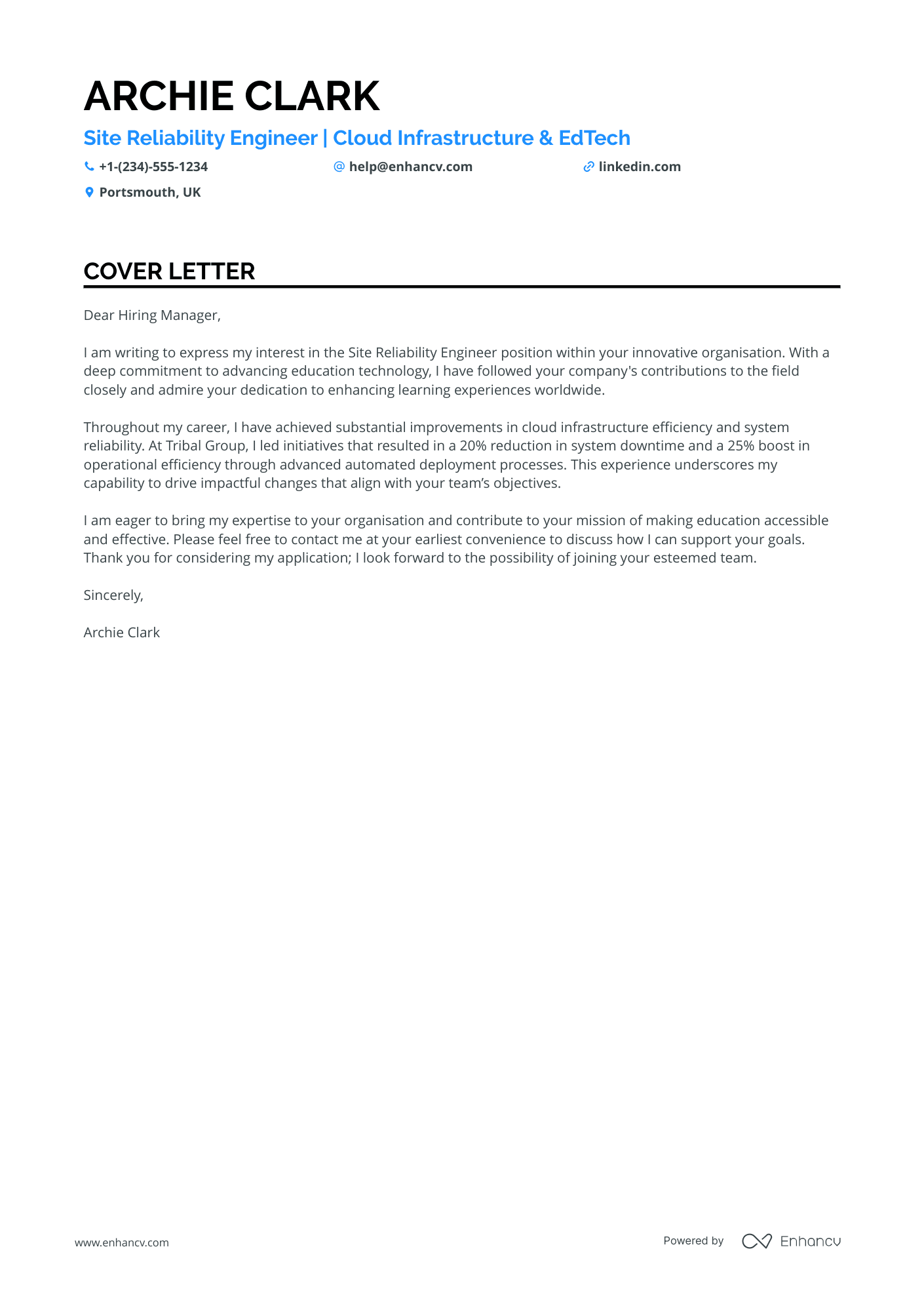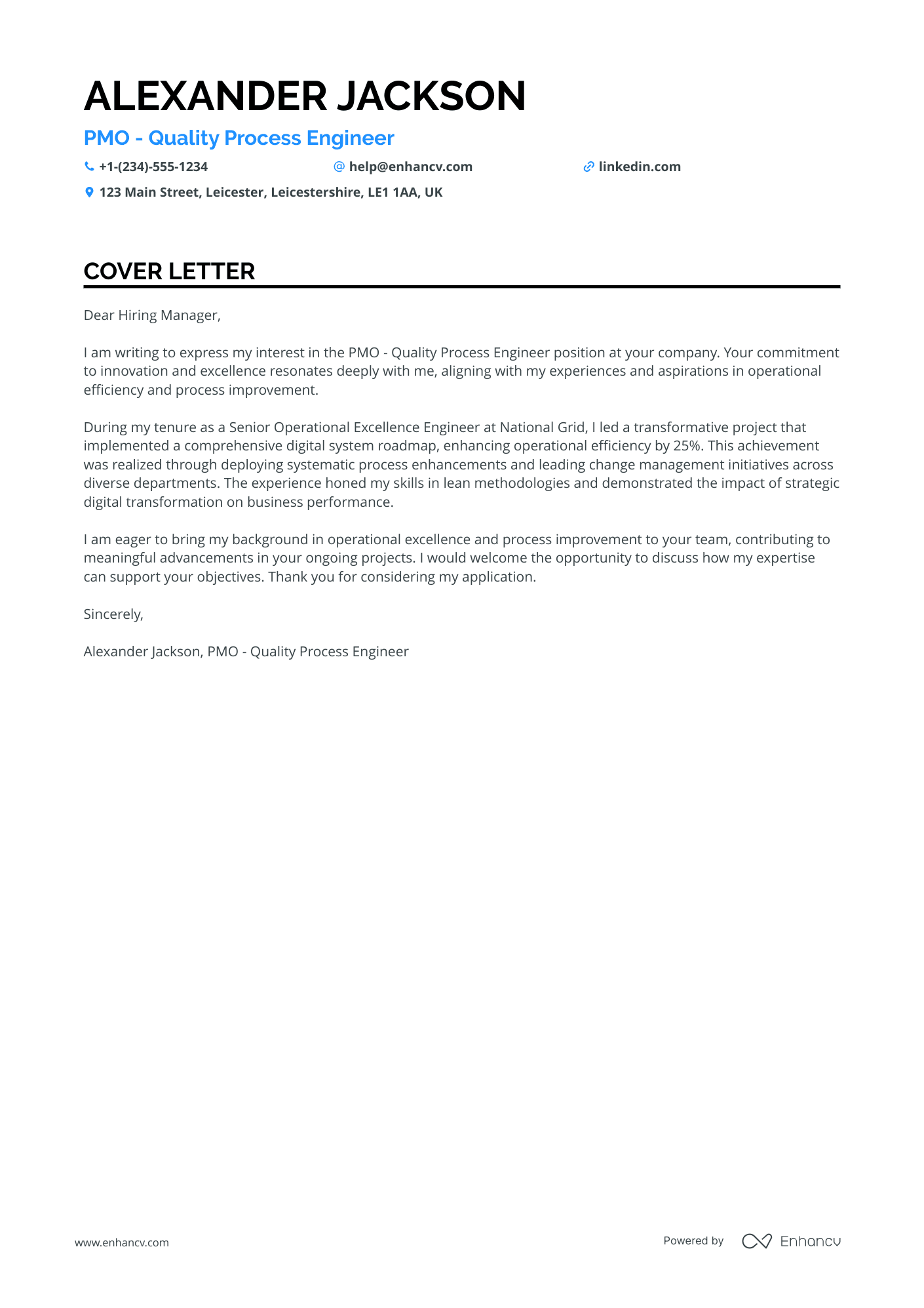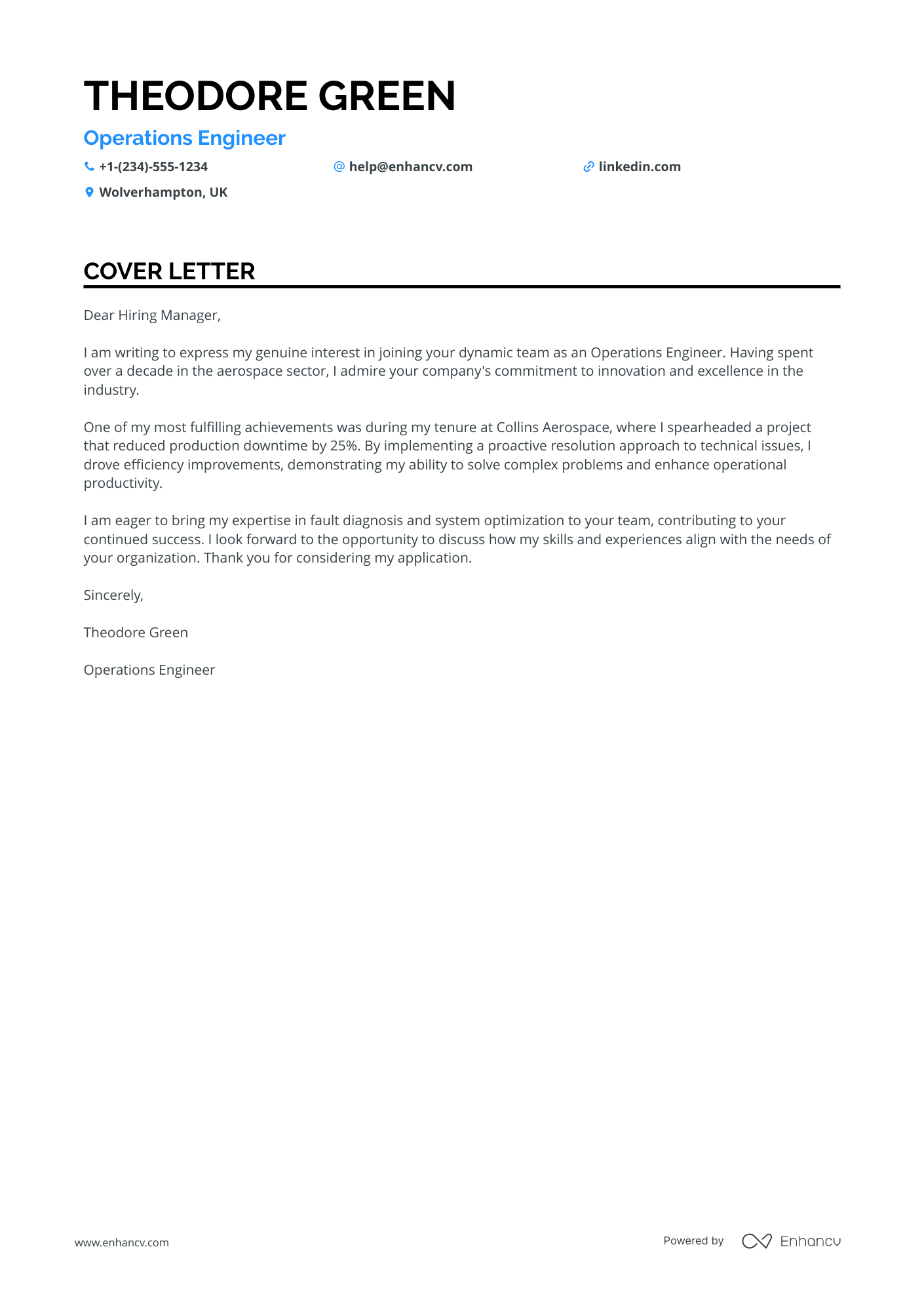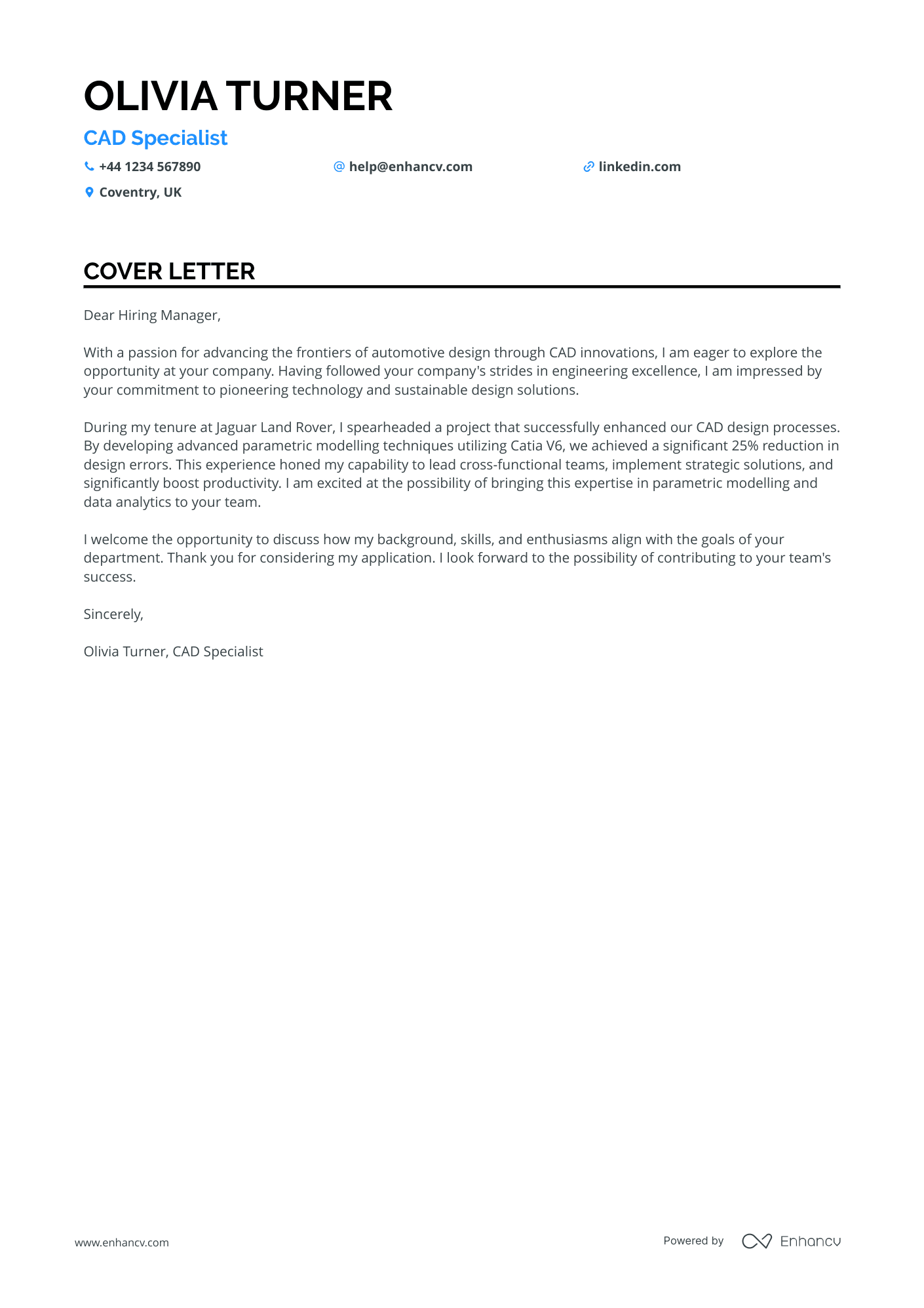You want your cover letter to strike the perfect balance between being professional and showing some personality. But how do you achieve this?
If you write too formally, your tone may come across as stiff. If you're too casual, it may sound overly conversational.
While modesty is always valued, how can you confidently present your skills without sounding arrogant or boastful?
This guide will help you find the right balance, ensuring your cover letter is both professional and personable, while focusing on the key job requirements.
Cover letter examples for process engineer
By Experience
Senior Process Engineer
- Highlighting Project Leadership: Emphasising the role in leading a £50M wastewater treatment project showcases significant leadership and budget management skills, pertinent to a senior engineering role.
- Focus on Efficiency Improvements: Mentioning the 25% increase in departmental efficiency and reduced design iterations indicates a proactive approach to improving processes, which is crucial for an engineering position.
- Emphasising Mentorship: Including mentoring of graduate engineers demonstrates leadership and a commitment to professional development, attributes valued in a senior engineering role.
- Certifications in Process Safety: Noting specific certifications, such as the IChemE certification in process safety, highlights expertise in a critical area of safety management, aligning with industry standards.
Junior Process Engineer
- Specific Achievements and Metrics: The cover letter effectively highlights Sophia's contribution to a 30% improvement in threat detection and a 25% reduction in incident response time, showcasing her tangible achievements in the field of cybersecurity.
- Relevant Certifications: Noting the completion of the "Certified Information Systems Security Professional (CISSP)" certification demonstrates Sophia's commitment to professional development and mastery of core security concepts, which are crucial for a role like Junior SIEM Engineer.
- Industry-Specific Skills: The mention of specific skills, such as "SIEM Configuration," "Threat Detection," and "Data Source Integration," aligns closely with the expectations for a Junior SIEM Engineer, making Sophia's qualifications highly relevant to the position.
- Project Leadership and Collaboration: Emphasising her role in leading a cross-departmental project underscores Sophia's ability to collaborate effectively across teams, a key competency in security operations centre environments.
Lead Process Engineer
- Emphasise Certifications and Training: Highlight relevant certifications such as Advanced HAZOP Leadership Training, which underscores the applicant's expertise in safety compliance and leadership.
- Highlight Key Achievements: Include specific achievements like the 30% increase in operational efficiency at Wood Group to demonstrate proven success and impact in previous roles.
- Utilise Quantifiable Metrics: Use quantifiable metrics to substantiate accomplishments, such as the 25% reduction in operational costs, to provide clear evidence of skills and effectiveness.
- Focus on Relevant Skills: Draw attention to specialised skills like HAZOP, LOPA, and asset management, which are directly applicable to the role of Lead Process Engineer.
By Role
Process Safety Engineer
- Highlight Relevant Experience: The cover letter effectively emphasises Alexander's 7 years of experience in process safety, particularly relevant to the role of Process Safety Engineer.
- Specify Key Achievements: It showcases specific achievements such as a 30% reduction in process incidents, which directly demonstrates the candidate's impact and capability in improving safety.
- Include Specific Skills and Certifications: By mentioning skills like HAZOP, RCA, LOPA, and certifications from prestigious institutions like TÜV Rheinland, the cover letter concisely communicates expertise and ongoing professional development.
- Link Past Roles to Present Aspiration: The letter connects past roles and achievements to Alexander's eagerness to advance safety management programs, demonstrating both experience and future ambition.
Process Development Engineer
- Emphasise Relevant Experience: Highlight specific achievements in previous roles, such as leading a project that increased treatment capacity and improved operational efficiency, to demonstrate directly applicable expertise.
- Highlight Certifications and Education: Mention any specialised courses and degrees relevant to the industry, such as a Master's in Environmental Engineering and a certification in Advanced Water Treatment Technologies, enhancing credibility.
- Showcase Industry-Specific Skills: Include competencies like Process Design, Water Treatment Engineering, and Sustainable Solutions to align with job requirements and demonstrate subject-matter expertise.
- Demonstrate Impact and Outcomes: Quantify accomplishments, such as a 40% improvement in water quality or a 15% reduction in project costs, to provide concrete evidence of your contributions and results-driven approach.
Process Control Engineer
- Highlight relevant certifications and specialised courses, such as the "Advanced HV Operations Course" and "Control Systems Safety Certification" to demonstrate expertise in key operational areas.
- Emphasise achievements that are quantifiable, like the 30% reduction in site downtime and the 40% improvement in system reliability, to showcase tangible contributions and effectiveness.
- Include specific skills pertinent to the role, such as "HV operational management" and "Emergency response," ensuring alignment with the job's core requirements.
- Detail past roles and responsibilities that show progression and increasing scope of influence, such as leading HV operational activities at UK Power Networks, to exhibit career development and leadership potential.
Food Processing Engineer
- Highlighting technical leadership and optimisation skills in the R&D Specialist role, such as achieving significant increases in efficiency and production capacity, demonstrates effectiveness in process scale-up and engineering solutions.
- Showcasing successful collaboration with cross-functional teams and international locations indicates strong communication and problem-solving skills crucial for large-scale food process engineering projects.
- Emphasising achievements in cost reduction and sustainable practices through innovative food engineering aligns well with industry's demand for efficiency and eco-friendly solutions.
- Mentioning relevant educational background and specialised courses in Food Engineering and Safety Regulations supports credibility in technical expertise and compliance within the field.
Bioprocess Engineer
- Highlights specific achievements in process improvement, such as a 40% boost in downstream process efficiency and a 25% reduction in purification time, which are crucial metrics for roles in biotechnology process development.
- Emphasises leadership skills by detailing experience managing teams and enhancing project delivery timelines by 20%, which is vital for a lead scientist position.
- Mentions technical expertise in AKTA systems and chromatography, aligning with the specialised requirements of bioprocess engineering and biotechnology roles.
- Includes mention of significant contributions to scientific publications and securing research funding, demonstrating the ability to advance the company’s scientific credibility and impact.
Process Design Engineer
- Tangible Results: Daniel effectively showcases tangible achievements and metrics, such as a 15% reduction in project costs and a 20% reduction in delays, which clearly demonstrate his impact in previous roles.
- Emphasising Leadership: Highlighting leadership in design coordination and processes standardisation emphasises his capability to manage and deliver on projects efficiently, a crucial skill for a Senior Process Engineer.
- Integration of H&S with Design: The cover letter underscores the importance of integrating health and safety (H&S) with cost-effective solutions, aligning well with industry needs and expectations for engineering roles.
- Commitment to Sustainability: Expressing a passion for sustainable practices and environmentally-friendly design solutions aligns with modern engineering priorities and showcases forward-thinking in product design.
Process Improvement Engineer
- Highlighting the "Lean Six Sigma Green Belt Certification" emphasises proficiency in process improvement and appeals to employers seeking expertise in reducing waste and increasing efficiency.
- Emphasising quantifiable achievements, such as a "20% efficiency increase," showcases the impact of your skills and experience in enhancing production outcomes.
- Explicitly stating a passion for "sustainable manufacturing" aligns with industry trends toward eco-friendliness and shows commitment beyond typical responsibilities.
- Showcasing leadership in "process development projects" clearly presents your ability to spearhead initiatives and drive company-wide improvements.
Process Systems Engineer
- Targeted Experience Highlights: The cover letter specifically mentions Oliver's extensive experience in systems engineering, governance, and assurance, which are critical for the role. The use of quantifiable achievements, such as improving lifecycle management by 30%, adds greater weight to his qualifications.
- Key Professional Achievements: Notable accomplishments, such as securing £5M in project funding and improving compliance by 40%, demonstrate his capability in handling high-stakes projects and adherence to standards, aligning well with the responsibilities associated with senior engineering positions.
- Relevant Education and Certification: Oliver's educational background in Mechanical Engineering and specialised courses in systems engineering and governance strongly correlate with his role's focus, demonstrating a strong foundation of theoretical and practical knowledge.
- Mentoring Emphasis: Highlighting his role in mentoring junior engineers showcases his leadership and commitment to the development of his team, a valuable trait for senior roles that require team collaboration and growth.
Process Validation Engineer
- Specialised Experience: The cover letter effectively highlights over 10 years of specialised experience in engine durability and hybrid systems, which is crucial for standing out in a competitive field.
- Certification and Skills Emphasis: Mentioning the Six Sigma Green Belt Certification and expertise in Six Sigma underlines proficiency in quality tools and methodologies, an important attribute for engineering roles involving validation and process optimisation.
- Quantifiable Achievements: The cover letter features specific achievements such as a 30% increase in system robustness and a 25% improvement in project delivery, which provide a clear picture of measurable success and impact.
- Leadership and Team Management: By showcasing leadership experiences such as leading a team of 12 engineers and improving project delivery performance by 25%, the candidate demonstrates strong team management capabilities indispensable for managerial roles.
Pharmaceutical Process Engineer
- Highlight Relevant Experience: Rosie’s extensive experience in the Radiopharma and Life Sciences sectors is prominently featured, positioning her as a strong candidate for roles requiring specialised knowledge in these fields.
- Emphasise Achievements: The cover letter showcases key achievements like increasing manufacturing efficiency by 30% and reducing material handling time by 40%, which demonstrate Rosie’s impact and value to potential employers.
- Showcase Certification & Courses: Mentioning certifications like the Radiopharmaceutical Manufacturing Certification underscores Rosie’s commitment to continuous learning and expertise in handling radiopharmaceutical materials.
- Highlight Project Management Skills: Rosie's ability to manage projects from prototype to completion within budgeted timelines showcases strong project management skills essential for senior mechanical engineering roles.
Process Automation Engineer
- Specific Technical Skills Highlighted: The cover letter clearly mentions technical skills crucial for a Test Automation Engineer role, such as Selenium, Java, SQL, and experience with BDD and TDD tools, reinforcing the candidate's expertise in automation testing.
- Quantifiable Achievements: It effectively uses statistics to demonstrate impact, such as increasing test coverage by 30% and reducing release cycle time by 20%, showcasing the candidate's capability to deliver measurable improvements.
- Continuous Professional Development: The inclusion of relevant courses like "Advanced Automation Testing with Selenium" illustrates a commitment to staying updated in the field, which is vital for roles that require keeping up with technological advancements.
- Collaboration and Communication: The letter highlights collaboration with cross-functional teams and enhancing communication between developers and testers, indicating strong teamwork and communication skills essential for agile environments.
Process Integration Engineer
- Highlighting Specialised Certifications: The cover letter mentions certifications such as 'Certified HL7 Interface Specialist' and 'Advanced FHIR Implementation', both of which are particularly relevant and advantageous for a role that requires expertise in digital integration within healthcare settings.
- Emphasising Key Skills and Experience: The letter effectively points out crucial skills and experience, such as leading EPR projects and enhancing system interoperability, which align with the responsibilities of a Digital Integration Engineer.
- Showcasing Achievements with Quantifiable Results: The applicant includes specific achievements with measurable outcomes, like a 30% improvement in system performance through data migration and a 20% increase in data accuracy, demonstrating their impact and effectiveness in previous roles.
- Passion for the Role: The cover letter includes a passion section where the applicant expresses enthusiasm for digital healthcare innovation and data security, aligning personal interests with the job's core responsibilities.
Process Application Engineer
- Highlighting extensive experience in incident resolution and application support in well-known companies such as BBC and Sky Group, demonstrating industry-specific expertise and reliability.
- Emphasising proven process improvements, such as a 40% reduction in incident response times and a 35% improvement in response time, which showcases the applicant's efficiency and impact on the organisation's performance.
- Featuring achievements in technological innovation, including developing custom monitoring solutions, indicates a proactive approach to enhancing system uptime and operational efficiency.
- Including certifications like Microsoft Azure Fundamentals and ITIL 4 Foundation Certification, underlining a commitment to continual professional development and specialised knowledge in managing IT service management platforms.
Process Reliability Engineer
- Mentioning certifications such as the "AWS Certified Solutions Architect" is crucial as it demonstrates specialised expertise in cloud technologies, which is essential for roles involving cloud infrastructure.
- Highlighting quantitative achievements, such as "improved system scalability by 30%" or "enhancing system reliability by 15%", effectively showcases the candidate's ability to drive tangible improvements in performance and operations.
- Emphasising significant skills like "System Scalability" and "Automation Tools" aligns well with the technical demands of a Site Reliability Engineer role, targeting key areas of responsibility.
- Including volunteering or passion projects, such as "EdTech Innovations", provides insight into personal motivation and commitment to the specific industry, which resonates well in the context of an EdTech-focused position.
Process Quality Engineer
- Highlight Relevant Certifications: The cover letter effectively points out certifications like 'Lean Six Sigma Green Belt' and 'Agile Project Management Certificate,' emphasising Alexander’s specialised expertise in process optimisation and project efficiency—essential for roles focused on operational excellence.
- Showcase Demonstrable Achievements: By including quantifiable outcomes such as a 25% increase in operational efficiency and a 30% reduction in process non-conformance, the letter makes impactful claims that are likely to resonate with potential employers.
- Emphasise Key Skills Relating to Role: The document prioritises mention of critical skills such as 'Lean Methodologies,' 'Change Management,' and 'Data Analysis,' providing a strong alignment with the job role of a Quality Process Engineer focussed on process improvement.
- Incorporate Language Proficiency: Including proficiency in English and French can serve as an asset, especially in multinational corporations or projects requiring cross-border collaboration, underscoring Alexander's potential to communicate effectively in diverse environments.
Process Operations Engineer
- Highlighting key accomplishments, such as reducing production downtime and improving manufacturing efficiency, emphasises the ability to deliver tangible results, crucial for an Operations Engineer role.
- Emphasising technical skills, such as fault diagnosis and system improvements, showcases the essential expertise required in the aerospace industry, directly aligning with the job's demands.
- Showcasing leadership and collaboration by leading cross-functional teams demonstrates capability in managing complex projects, a key aspect of operations management.
- Mentioning continued professional development through relevant courses and certifications supports a commitment to staying updated with industry advancements, reflecting a proactive approach to career growth.
Process Engineer cover letter example
Olivia Turner
Coventry, UK
+44 1234 567890
help@enhancv.com
- Highlight Relevant Experience: The letter effectively mentions previous work at Jaguar Land Rover, where leadership in a project contributed to improved CAD design processes. This experience is directly applicable to the target role.
- Specific Achievements: The specific achievement of reducing design errors by 25% through parametric modelling techniques is exemplary. Quantifying successes helps demonstrate value to potential employers.
- Technical Skills and Software Proficiency: Mentioning proficiency in Catia V6 is critical, as it aligns with the technical requirements typical for a CAD Specialist position in automotive design.
- Alignment with Company Values: The introductory focus on the company’s commitment to pioneering technology and sustainable design solutions shows alignment with the hiring company’s goals and values.
Importance of cover letters in the United Kingdom
Cover letters are a vital part of professional job applications, helping shape recruiters' first impression of your profile.
Here’s why they’re important:
- Indicates your genuine interest: A well-researched cover letter reflects your knowledge of the company and role.
- Professionalism from the outset: Employers expect your cover letter to be structured, polite, and formal. If you wish to add a more personalised touch, be sure to address your recipient directly.
- Capture the recruiters' attention: For most roles, candidates tend to have rather similar experience, which is why you should use your cover letter to explain what is unique about your profile.
What UK employers expect from a cover letter
Want to make an excellent first impression on your UK employers with your cover letter?
Here are three handy tips and tricks to keep in mind when creating yours:
- Take the time to research: Invest in learning about the company and role by exploring their website, social media, and doing a thorough Google search. Focus on the products and services they offer, as well as awards and industry recognitions.
- Focus on the company's values: Refer back to your research and to uncover what the company believes in. Integrate those values into your cover letter by explaining how you embody them. For example, if they value diligence, highlight how you’ve consistently met tight deadlines or successfully managed heavy workloads.
- Align your skills with the job requirements: Read the job advert carefully and identify the most sought-after skills. Select the top three skills that you can substantiate with your most noteworthy achievements, to demonstrate your expertise in those areas.
How to format a process engineer cover letter
Have you ever wondered about the formatting and structure of your cover letter?
Read on to discover some guidance from industry-leading professionals:
- Within the header, include your address and contact details, the employer's name and address, and the date, followed up by a personalised salutation.
- The body should should consist of an opening paragraph, middle paragraphs expanding on your unique experience and skills, and a closing paragraph.
- End with a formal sign-off and your signature.
- Choose modern fonts such as Volkhov, Chivo, or Bitter instead of the more traditional Arial or Times New Roman.
- All of ENhancv's templates maintain single-spacing with approximately 1-inch (2.5 cm) margins on all sides to ensure a neat presentation.
- Always send your cover letter as a PDF to keep the formatting intact and prevent any edits once submitted.
Your CV and cover letter maintain consistent formatting. Use the same fonts, margins, and style to create a professional and cohesive look for your application.
Finally, remember that Applicant Tracking Systems (the software some companies use to align job keywords to your experience, also known as ATS) do not read cover letters–it's intended solely for recruiters. Make it stand out by highlighting your achievements and relevant skills for the role.
How to write your process engineer cover letter salutation
In a world of AI and instant prompts, taking the extra time to personalise your cover letter truly makes a difference.
Address the hiring manager directly with a customised greeting (e.g., 'Dear Mr Bond', 'Dear Ms Penny').
You can often find their name on LinkedIn (under the job listing or by searching) or in the ‘About’ or ‘Meet the Team’ section of the company's website. If in doubt, you can also contact the reception for assistance.
If you can't find the name, rather than using 'Dear Sir or Madam', opt for something more personal, such as 'Dear [Company Name] Hiring Manager'.
How to write your process engineer cover letter intro
Employers do want someone who not only delivers results but does so with enthusiasm.
Thus, a great way to start your cover letter is by showing how your personal passions align with the role.
Highlight one or two aspects of the job description that resonate with you, and explain why this makes you a perfect fit for the company and its culture.
How to write your process engineer cover letter body
Which makes for a stronger cover letter body: a long-winded account of everything you’ve ever done, or a focused achievement that’s directly relevant to the job?
Hint: recruiters prefer the second.
When writing your cover letter, select your most impressive achievement that:
- Directly aligns with the job description and role.
- Is quantifiable with tangible metrics like numbers or percentages.
- Maps out your hard and soft skills, showcasing what makes you unique.
- Tells the story of the impact you could have on the organisation.
How to write a closing paragraph
You’ve written a brilliant cover letter so far—so don’t undermine it at the very end.
If you think signing off with a polite 'Kind regards' or 'I look forward to hearing from you' will make a strong impression, think again.
A better approach is to make a tangible promise—one that reflects both personal and professional growth—and demonstrates your value to the recruiters.
Alternatively, encourage the hiring managers by asking when you might expect to hear back from them.
Conclusion
A standout cover letter is crucial for making an strong impression in your job search in the UK market. Personalise your letter by addressing it to the hiring manager and aligning your skills with the job description.
Use concrete examples to highlight your greatest achievement and convey your enthusiasm for the position. Finally, ensure that both your cover letter and CV are presented professionally for a consistent application.
